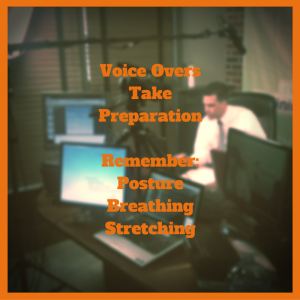The Art Of Voice Overs – Part 2
Producing voice overs is an acquired skill. Just because you talk all day does not mean that you are fully qualified for voice overs. As a matter of fact in part 1 of this series we referenced the fact that when we hear our own voice it can be quite disconcerting. You can quickly isolate the imperfections in your voice quality. Things like word whiskers, smacking of the lips, how we use the letter “S” when it appears at the end of a word and many others are items that we don’t normally recognize unless someone points it out or we hear it for ourselves.
This brings us to Part 2 of our series: The Art of Voice Overs. We will cover voice articulation and speaking best practices in this post. With some very simple tips you can make some major corrections in your voice quality. Let’s start with posture.
Posture
Good posture is important no matter what. I don’t know about you but the moment I say or think the word posture my back straightens out. Good posture is critical for voice overs since your upper torso needs to be fully extended in order to engage the full capacity of your lungs and diaphragm. When you are slouched over you are compressing the ability to complete multiple sentences in one breath. Good posture also helps with your alertness. You are telling your body that you are in work mode so to speak. Good posture creates images of formation, clarity, discipline. These are all positive words that will assist you with your voice overs.
Breathing Exercises
When I first started performing voice overs it was quite amazing to hear myself run out of breath. It was also interesting to  hear me inhale while performing voice overs. The microphone picks up everything. This is where breathing exercises come
hear me inhale while performing voice overs. The microphone picks up everything. This is where breathing exercises come
into play. Once you actually hear yourself breath you become much more conscious of the fact. It’s time to learn how to breathe silently. Take a look at your script and identify how many words or sentences you feel you can realistically voice in one breath. That is a good starting point since you can look at your script and identify your stop points. Doing this ahead of time helps minimize the amount of do-overs. Once you have that somewhat mastered you can then move on to performing voice overs in multiple breaths. This is where the breathing in silence comes into play and it takes practice. People who are into meditation and yoga are naturals at this. Breathing exercises are very important for both of those disciplines. You are turning a body movement that is typically subconscious into a conscious one. That fact alone will help you discipline your breathing.
Open Your Mouth
Mumblers and voice overs do not mix. You need to open your mouth fully in order to have great sounding voice overs. What do you typically do before you work out? You stretch, correct? It’s no different with voice overs. You need to stretch your mouth. According to KenHub.com there are about 20 different muscles in your face. This fact alone helps us realize that stretching is extremely important. With fully stretched facial muscles you will have an easier time articulating your words. Your pronunciation will be accurate. Your clarity will make your content understandable. Opening your mouth and performing facial exercises also enables you to use proper emphasis when needed. There is nothing more boring than a monotone voice. As you prepare for your voice overs, look for words or phrases that you would like to inflect or emphasize. This is especially important when you are highlighting the main point of a lesson. Every sentence, every paragraph and every lesson has a main point or a sub main point that needs emphasis. By stretching your facial muscles and opening your mouth you will see a vast improvement in your pace, pitch and power.
This wraps up Part 2 of The Art of Voice Overs. If you have any tips or comments please feel free to share in the comment section below. Below is a short video on how the Edmego course builder can really help streamline your content creation process. Reach out to us if you have any questions.
Written by Jonathan Saar
Would you like to learn more about Edmego?
[contact-form to=’jonathan@edmegolearning.com’ subject=’Voice Over Part 2 contact form ‘][contact-field label=’Name’ type=’name’ required=’1’/][contact-field label=’Email’ type=’email’ required=’1’/][contact-field label=’Website’ type=’url’/][contact-field label=’Comment’ type=’textarea’ required=’1’/][/contact-form]



